CONSTITUTIONAL CRISIS IN CATALONIA
Catalonia’s bid for independence: how did we get here?
With Madrid and Barcelona seemingly on a collision course, is negotiation even an option at this point?
Madrid
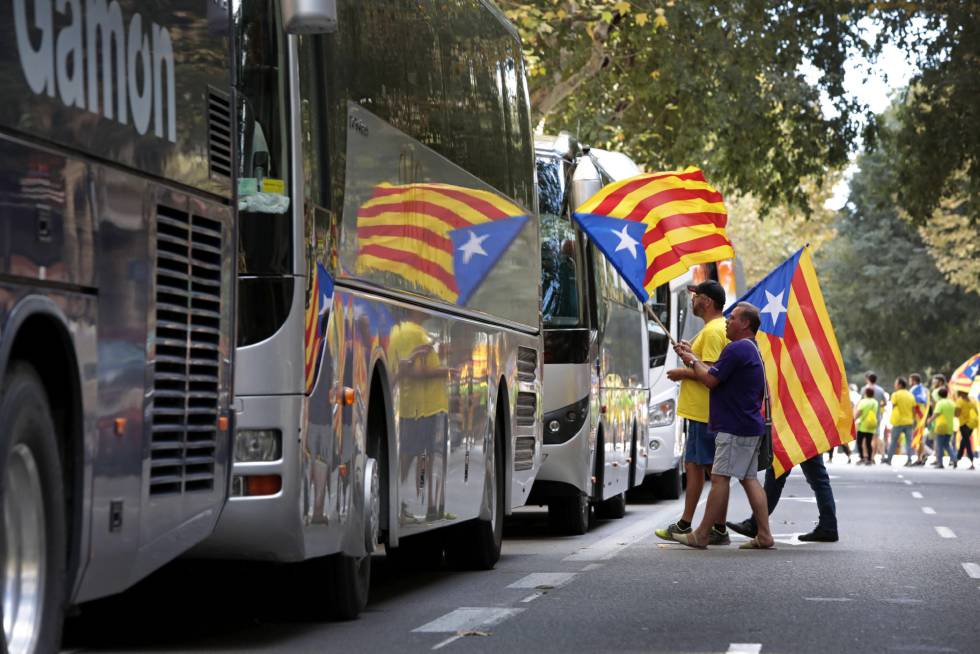
Pro-independence supporters board buses to attend La Diada, or Catalan National Day. SUSANNA SÁEZ (EFE)
With just over two weeks to go before Catalonia holds an independence referendum that Spanish courts have ruled illegal, Catalan premier Carles Puigdemont and three other high-profile officials have sent a joint letter to the king and prime minister of Spain asking for a negotiated way out of a quickly escalating confrontation.
The message calls for “an open dialogue with no strings attached. A political dialogue, from the legitimacy that each party represents, to make possible what is never a problem, much less a crime, in any democracy: listening to the voice of the citizens.”
Catalan premier Carles Puigdemont calls for “an open dialogue with no strings attached”
Yet at the same time Puigdemont is continuing down the path of outright disobedience: on Thursday he officially launched the campaign to hold the October 1 referendum, which has already been suspended by the courts and which Madrid opposes on the basis that it violates the Spanish Constitution. Any legal vote, says the Spanish government, would first have to be debated and approved inside the Spanish parliament.
And later on Friday, one day after Catalan authorities announced they will no longer send reports to Madrid explaining how they are spending public money, the Spanish cabinet approved giving the Spanish treasury effective control over the Catalan government’s accounts. This measure will go into effect if Catalan authorities do not provide guarantees within 48 hours that not one euro of public money will be used for the illegal referendum.
This latest move only adds to the tremendous strain on relations between Madrid and Barcelona, which seem to be on an unavoidable collision course. In recent weeks, the acts of defiance against the central government and the Spanish justice system have been multiplying, and Madrid has been pushing back with equal vehemence.
Earlier this month, Catalan separatists used their slim majority in the regional parliament to enact legislation paving the way for the referendum and for a hypothetical transition into an independent republic.
Spanish courts warn public officials cooperating with the illegal referendum they could be prosecuted
The ruling Junts pel Sí coalition and its partner, the radical left-wing CUP party, employed a unique method to push the bills through parliament in record time, skipping several procedural safeguards. The opposition walked out of the chamber in protest, accusing the government of commandeering parliament to achieve its independence goals with contempt for legal procedure.
The Spanish courts responded by suspending the Catalan laws and warning all public officials in the region that cooperating with the illegal referendum could entail prosecution for criminal offenses.
Mayors who pledged to cooperate with the vote by lending municipal premises have been placed under investigation and told to appear in court. Those who refuse to show up could be arrested, although this task would fall to the Mossos d’Esquadra, the regional police force, which is under the Catalan government’s control.
The tension has spilled over to everyday life, eroding the social harmony in a region that is home to 7.5 million people, many of them immigrants from other parts of Spain and the world. Some mayors who publicly refused to cooperate with the referendum have been targeted by secessionists and subjected to harassment and even threats. And non-nationalist Catalans report a constant low-key pressure to keep silent about their views or face “civil death.”
Aides to Prime Minister Mariano Rajoy said that he is under pressure from the more hawkish circles in Madrid to “bang his fist on the table” in the face of secessionist taunts. But the Popular Party (PP) leader has issued instructions to “keep a cool head” in order to prevent any kind of street conflict that could spark a wider crisis, said sources familiar with the situation.
In theory at least, the central government could adopt “the necessary measures”to force a regional government to obey the Constitution and national laws, as per section 155 of the Spanish Constitution. But this tool has never been used since Spain returned to democracy in the late 1970s.
Instead, Rajoy’s strategy has been to use existing laws to stop the referendum from taking place by undermining its infrastructure and logistics. Earlier this week, he told the 55,000 citizens who have been selected by the Catalan government to staff the polling stations that they should not go, as the referendum is illegal.
Rajoy’s strategy has been to use existing laws to stop the referendum by undermining its infrastructure and logistics
In a rare display of unity in Spanish politics, opposition parties have for the most part closed ranks around the government. The Socialist Party (PSOE) is proposing a new “federated” state structure that would acknowledge Spain’s various “nations” to a greater degree than the current system, but has not provided specific details about how this new structure would work.
Meanwhile, separatists have been taking their message abroad, portraying theirs as a struggle by a unified nation against an oppressive state and drawing comparisons with Kosovo. But the question remains of just how many Catalans support secession.
Opinion surveys suggest declining support for independence. A July pollconducted by the Catalan government’s own Opinion Studies Center showed 41.1% in favor of splitting from Spain, down from 44.3%, while 49.4% were opposed to it.
And at the recent pro-independence march on September 11, Catalonia’s “national day” or Diada, organizers estimated a turnout of one million people (police estimates were lower), compared with 1.8 million last year.
But Puigdemont, whose Junts pel Sí coalition and CUP together received 48% of the vote at the last regional election in 2015, feels that he has a popular mandate to break away from Spain.
If Catalonia finally holds its ballot, it will not be the first one. Around 2.3 million people voted in an informal “participatory process” held on November 9, 2014 after the Spanish courts ruled a proper referendum illegal.
Puigdemont may be feeling that the time is now to make their break from Spain in case support for independence continues to decline
Although 80% voted in favor of independence, turnout was low – there was an eligible voter pool of 6.3 million, according to the regional government’s own figures – and it was dismissed by international observers as lacking sufficient democratic safeguards.
Artur Mas, the Catalan premier at the time, was tried for disobedience in March of this year and barred from holding office for two years.
Observers note that Madrid and Barcelona lost an opportunity to reach a deal over greater fiscal powers for Catalonia in 2012. At a time when Spain was in the grip of a vast economic crisis and corruption scandals were hitting politicians everywhere – including several in Catalonia’s Convergència party, which now governs under a new name as part of Junts pel Sí – the Catalan government began to push the notion that an independent Catalonia would be rid of its problems.
The idea gained momentum, and that same year two million people turned out at the Diada to demand independence, while a November 2012 survey showed 57% support for secession. But as Spain itself pulled out of the crisis, surveys started to show a decline in support, and Puigdemont may be feeling that now is the time to make their break from Spain.
Also on Friday, the influential business association Círculo de Empresarios held a news conference asking politicians to “return to the spirit of the Spanish Transition to create a mood that is conducive to pacts, instead of thinking about partisan interests and votes.”
But given the latest events, a negotiated solution that is acceptable to all parties seems like an increasingly distant goal.
English version by Susana Urra.
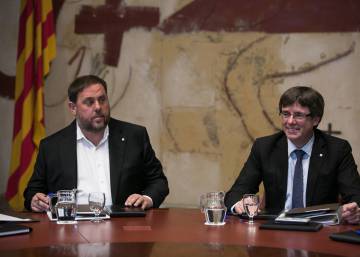
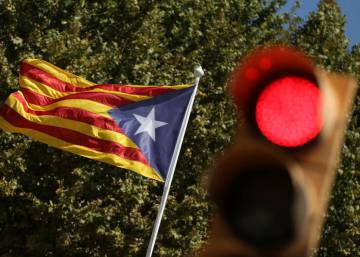
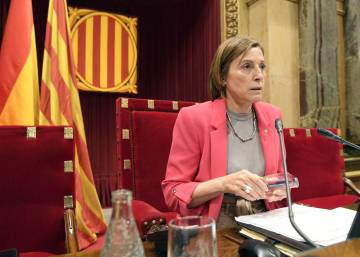
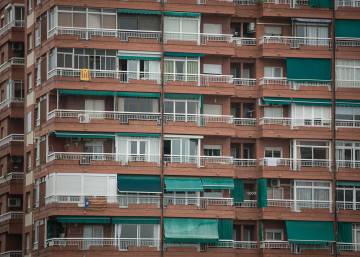





































No hay comentarios:
Publicar un comentario